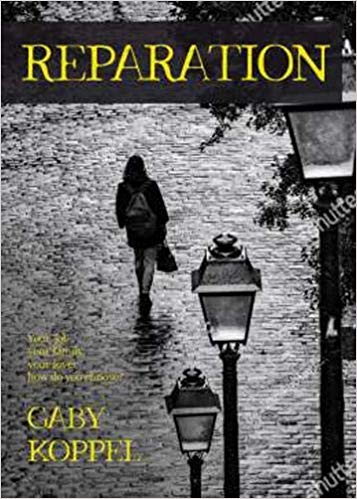Norena Shopland reviews Reparation, the debut novel from Gaby Koppel, and finds much to think about within a novel which combines mystery with the tangled relationships of dysfunctional families.
When Gaby Koppel began her debut novel Reparation she clearly took to heart that old writer’s adage, write about what you know. And so she turned to her own life experiences and the challe nging relationship she had with her own mother, to write a novel charged with a number of difficult themes, not least dysfunctional families.
nging relationship she had with her own mother, to write a novel charged with a number of difficult themes, not least dysfunctional families.
The story begins with a car journey as Elizabeth and her father cruise around an airport terminal looking for the mother Mutti, who has been thrown off a flight for being drunk. The opening narration is assured and captivates the reader’s interest, enticing us onwards to see what is compelling Mutti. Slowly the background to the mother’s tangled life begins to emerge, particularly after the death of Elizabeth’s father; and she is drawn more and more into taking care of a woman she has been trying to escape. As she commutes between London and Cardiff her disparate lives begin to converge.
The setting is 1997 and the story is narrated by Elizabeth. She is a TV journalist working for a Crimewatch-type program reconstructing particular cases in an appeal for information. Something Koppel knew well, having worked on Crimewatch UK herself.
Elizabeth is assigned a case about a child abduction in the Hasidic community, an intensely private world bound by strict rules and faith. It is a world which rarely welcomes intruders, does not open to societal scrutiny and crossing the border into Stamford Hill is like entering another country. Furthermore, they hold television to be an evil influence and trying to convince a community to welcome in a media avid for sensation is a difficult job. Yet despite the fact that they ‘dress like they are still living three hundred years ago (in) the backwoods of Poland’, Elizabeth finds the Hasidic Jews compelling. Their surety of identity a contrast to the tangled identities of both her and Mutti. Koppel’s portrayal of the community is fascinating and leaves one wanting to know more – particularly as they, in turn, spurn our interest. However, this part of the story appears only as a background and it flits in and out of the main narrative. So little time is spent on the crime one is left wondering what is happening and what is the connection to the main story, but perhaps that’s the point. The slow progress of the criminal investigation and not the quick fix of crime dramas solving any mystery in an hour. Elizabeth also seems to be able to take an inordinate amount of time off work without censure and one wonders if that’s really the case with journalists.
The main narrative of Reparation is about Mutti, her drunkenness and antics which constantly pull Elizabeth away from London back to Cardiff. The mother’s character is both attractive and repelling and she is by far the strongest and most interesting person in the book; not surprising when Koppel based the portrait on her own mother. Those who have knowledge of alcoholics will empathise. Next to Mutti Elizabeth seems weak almost to the point of irritation, and her obsession with her mother means she hardly notices her boyfriend fading from her life. Mutti is also in the early stages of dementia adding to Elizabeth’s worries regarding the future – just how does one care for an alcoholic mother heading for senility?
Mutti meanwhile had come up with an idea to reduce her straitened circumstances by claiming compensation from the Hungarian Government for land lost during the war. We learn more about her background and the reasons that drive her into alcoholism – and we begin to sympathise. Suddenly Elizabeth receives a phone call to say her mother has been arrested in Budapest and the two are thrown together closer than ever before in their lives. The scene where they become lost is particularly touching as Elizabeth begins for the first time to truly understand her mother and the construction of her own personal baggage.
From here the pace starts to fade, the story becomes too familiar and the reasons for Mutti’s anguish too predictable. Or is it that we have become inured to the atrocities of WWII that they begin to appear like a meme? Ultimately, the ending is too neat, a guilty conscious quickly assuaged and that’s that. Likewise, Mutti’s care is neatly solved and life can settle down to a semblance of normality.
Despite the weak ending, Reparation is a good read and the themes Koppel deals with are powerful – restitution, justice and forgiveness. But it is also about assumption. That knowledge people have of each other, how it is grounded and how so often it is groundless. As Elizabeth’s experience with the Hasidic community changes her views of them so she changes in her attitude to all those around her. By removing the assumptions she created over time and which has enabled her to judge them, she begins to see new people and experience new understandings. Perhaps that is the message of the book – that the assumptions we create about people are often wrong.
Reparation by Gaby Koppel is available now from Honno Press.
You might also like…
Sophie Baggot reviews Elizabeth Parker‘s debut poetry collection, In Her Shambles, which explores an array of strong female characters.
Norena Shopland is the author of Forbidden Lives: LGBT stories from Wales; The Curious Case of the Eisteddfod Baton (forthcoming November); and The Veronal Mystery (forthcoming January).












